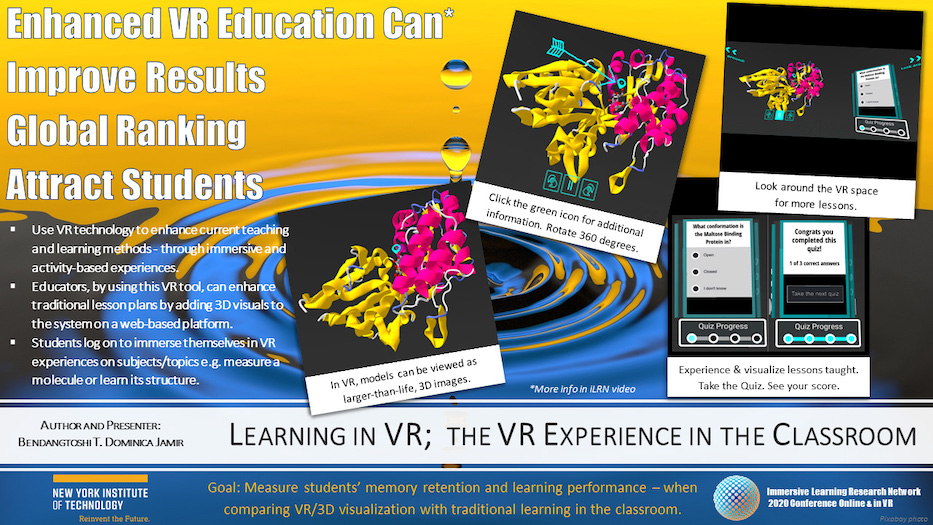
A Winning Proposal
July 8, 2020
The microscopic nature of molecular sciences, which explore the smallest fundamental units of a chemical compound, can be an abstract concept for many students. After all, how can one fully understand the intricacies of something that can neither be seen nor experienced in person?
Now, Dominica Jamir, a graduate student in New York Institute of Technology’s UX/UI (user experience/user interface) design and development program, has created a virtual reality (VR) application to immerse students in their biology and chemistry lessons, allowing the molecules to come to life before their eyes. Her project, Intellect VR: Learning in VR; The VR Experience in the Classroom, was named “Best Practitioner Poster Proposal” at this year’s International Conference of the Immersive Learning Research Network (iLRN), held June 21 to 25.
The Box sat down with Jamir to learn more about her winning proposal.
Tell us about your project and how you envision this application will improve scientific coursework.
My project was approached with the intention to use VR technology as a tool to enhance current teaching and learning methods through immersive and activity-based experiences using VR headsets. College professors, in addition to their traditional teaching methods of subject matter/lesson plans, use a web-based platform to enhance the lessons by adding 3-D visualization experiences in the VR system. Students, after logging in, can immerse themselves in VR experiences on topics such as measuring the size of a molecule or learning its structure, through the web-based platform.
How would a student experience the molecules?
In VR, a molecule can be viewed as a larger-than-life 3-D image. Minute details are enlarged for clarity and certain sections of the subject molecule are clickable to obtain additional information on that topic. The molecule has the option to be rotated in VR so as to provide students with 360-degree views of the subject image. Students, while immersed in VR, get to experience a molecule in-depth, and can visualize the lesson taught earlier.
What about the lessons? Can students test what they are learning in the lessons?
Each molecule ‘lesson’ comes with its own set of multiple-choice questions. Each optional choice answer has a radio button that records responses and provides a total score at the end of the quiz. Upon completion of a lesson and quiz, the student can choose to continue on to the next lesson or, opt to ‘look around’ the VR space to see what lessons are available. The student will then see rotating molecules with respective lesson names below them to choose from if they wish to take another lesson and quiz.
How do you envision this project improving subject matter comprehension and, potentially, academic performance?
The goal of my research is to measure students’ memory retention and learning performance, like comparing VR/3-D visualization of molecules with traditional 2-D learning materials in a classroom. Audience members, after experiencing molecules in an immersive and enhanced learning environment, can understand and retain complex scientific concepts that have been brought to life in VR. Potential benefits to academic institutions could be that professors enhance their lesson plans to facilitate stronger student comprehension of subject matter and retention for better test results.
Watch Jamir’s project proposal, or view her thesis.

Click to Watch: Learning in VR | The VR Experience in the Classroom
More Features

An Alumnus’ Commitment to the Environment
As an energy management graduate from New York Tech’s Vancouver campus, Jasdeep Gulati (M.S. ’22) is highly invested in educating people about environmental and climate sustainability.

Vancouver Faculty Win University-Sponsored Research Awards in New Program
The new Global Impact Research Grant (GIRG) program has been developed to keep Vancouver-based faculty connected to faculty and research projects being conducted on the university’s New York campuses.

Studying Climate Change One Degree at a Time
Junhua Qu (M.S. ’24) began her collegiate journey in Beijing. But, her interest in climate change took her to New York Tech’s Vancouver campus to study energy management.
